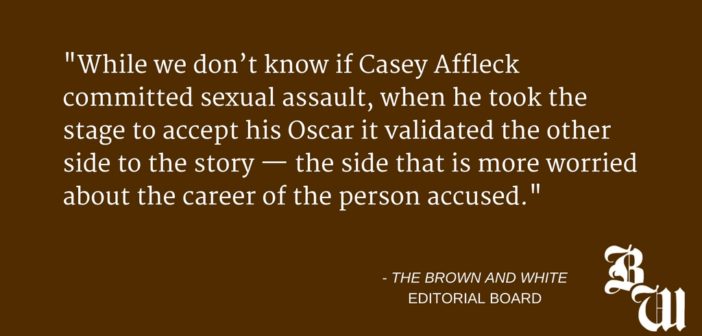How much does an award matter?
We found out at the Oscars when two realities transpired over the course of about a minute — one in which “La La Land” was the Best Picture of 2016 and one in which “Moonlight” was.
While nothing about the films changed in that time, our perceptions did. And the most important change was that of validation. Every winner on the night was validated for their work and contributions to the industry.
Notably receiving validation was Casey Affleck, who was recognized as Best Actor in a Lead Role for his performance in “Manchester by the Sea.”
Affleck was accused of sexual assault in 2010, and though he was never charged because he settled the case out of court, many believe it was wrong for him to be rewarded on a global platform.
This reaction went viral on Twitter:
Tell me again how rape and sexual assault accusations will ruin a man's career
— Paxmee (@Paxmee) November 9, 2016
Without going into the details of Affleck’s case, his situation brings up the larger question of how we should treat those who have been accused of sexual assault or rape.
The notion that we need to tread carefully in how we treat those accused because we could jeopardize their future is a seemingly legitimate claim with little to back it up. Even celebrities sit in the spotlight with accusations against them, and often there are no substantial effects.
Affleck still won his award. Donald Trump was still elected President of the United States. Bill Cosby still lived out his entire career before formal actions were taken against him.
More importantly, the social deterioration of a person accused of sexual assault is arguably less damaging than the emotional trauma of the person who reported it. The burden of knowing people are aware of your assault, in conjunction with possible post-traumatic stress disorder, is a dreadful combination.
When Stanford swimmer Brock Turner went to trial for rape, a letter was written by his victim that detailed the lasting impact it left on her. The fact that he only served three months after being found guilty was a despicable outcome.
Even while there are cases as frustrating as Turner’s, when it comes to Affleck and others who might have settled out of court, there is still a tough debate to be had.
The dilemma is as follows: the “innocent until proven guilty” framework that exists in our judicial system can be hard to stick to morally in the case of sexual assault because it can be extremely challenging to prove in court.
It’s especially difficult to believe an accused person’s innocence when on college campuses across the country there have been studies that show approximately 1 in 5 female undergraduates have experienced sexual assault.
On top of that, it can be difficult to even report an assault.
There seems to be a doubt about the 1 in 5 statistic at times, but a study funded by the U.S. Department of Justice concluded that only 2 to 10 percent of all sexual assault reports are verifiably false.
Granted, the idea of a claim being verifiably true or false leaves out the middle ground. Using the same data, after removing the cases that did not proceed (44.9 percent) and the cases that did not have enough information (13.9 percent) it leaves only 35.3 percent left for cases that led to formal charges.
But there is a lesson to be learned in the uncertainty, which is that it is so tough to gather enough evidence that most cases aren’t even able to be determined as a true or false accusation.
It often takes an army to prove someone guilty, and even when the evidence is clear as day there are culprits like Turner, who will live out the rest of his life having served minimal time and leaving his victim forever tarnished.
While we don’t know if Affleck committed sexual assault, when he took the stage to accept his Oscar it validated the other side to the story — the side that is more worried about the career of the person accused.
It was a point for the bad guys.






Comment policy
Comments posted to The Brown and White website are reviewed by a moderator before being approved. Incendiary speech or harassing language, including comments targeted at individuals, may be deemed unacceptable and not published. Spam and other soliciting will also be declined.
The Brown and White also reserves the right to not publish entirely anonymous comments.